Hantana – A Fond Farewell – By GEORGE BRAINE

Three years ago, in March, I drove away from Hantana for the last time, ending a long relationship, perhaps a romance. As with any relationship that ends, the memories are bittersweet, for the house at Hantana had been our beloved second home for 35 long years.
For those who have been students at Peradeniya University, or for older fans who recall the hit movie Hanthane Kathawa, or more recent fans of Amarasiri Peiris’ Hantanata payana sanda, Hantana has an aura of romance, of nostalgia, of lost love. But this is not about that Hantana; over the range of hills from Peradeniya, above the city of Kandy, is the other Hantana where my house was located.
In the mid-1980s, when I was planning to travel abroad for higher studies, my son was schooling in Kandy. “If you buy us a house in Kandy” my parents said, “We will move there to look after him”. I couldn’t afford a Kandy house, but President Ranasinghe Premadasa came to our rescue. In his wisdom, he realized that middle-class folks also needed public housing and launched the Hantana Housing Scheme.
So, with our parents and our son, my wife and I drove there for a visit. Past the Bogambara prison, the playground, Kandy hospital, and Hanatana Hotel, we drove up a steep, winding road. Two miles from the city, on the edge of Hantana Estate, with a clear view of Hantana hill, the housing scheme began. Only some of the terraced houses had been completed, and only one or two families had come into occupation. The location was spectacular, the price was right, and we decided to buy.
Early Days
My parents moved to Hantana in 1984. The garden, cleared of tea bushes, was barren. They planted mangoes and avocados – which bear fruit even now – and flowering plants that thrived under my mother’s tender care. Most families had children, and my son quickly made friends, playing cricket on an improvised playground, visiting each other’s homes, but mainly just hanging out. A tiny CTB bus, with its entrance and exit at the rear, came up to our doorsteps. A post office and a co-op opened, and the early residents started a welfare society. The Housing Authority made sure the roads were lit and kept cleared of weeds. When I first visited, in 1986, I saw a community of residents who had arrived from all over the country,
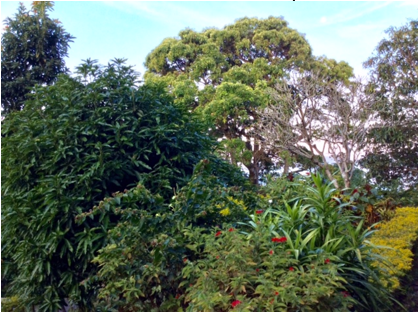
The lush garden
and belonging to every race and creed. Most were senior government officials, and there were a few doctors and lawyers, too. At dusk, I heard the voices of children on the internal road below, returning from their cricket, talking and laughing. Safe, harmonious, almost Utopian.
The houses blended aesthetically with the hilly terrain, and to protect from landslides, their foundations went down to 14 feet. The scheme had a central sewerage system, where the water was purified and recycled. I was told that the engineer in charge, in the presence of distinguished guests, drank a glass of recycled water to prove its purity!
But the scheme had a hidden past. Its construction had been awarded to an Italian company, and local workers and subcontractors had fleeced them at every opportunity. Lorry loads of building materials would enter from the lower gate, obtain the signature of a corrupt official that the material had been unloaded, and exit at the upper gate without unloading. Then, they would repeat the process. Toilet fittings newly installed would vanish overnight. I was told that a thief, carrying a plate glass removed from a window, was decapitated when he stumbled and fell while scrambling downhill.
Unable to bear the losses, the Italian engineers vanished one night, taking a flight back home. Left high and dry, the Housing Authority was compelled to sell the unfinished houses for a song.
Scenery, Serenity
For me, mornings were the best time at Hantana. My house had a direct view of Hantana hill, and, with a steaming coffee in hand, I would sit on the terrace, enjoying the cool breeze, the hill coming into view as the mist lifted. In the distance, Bible Rock towered over the blue, rolling mountain range. As Kandy woke-up in the valley below, the whistle of a train would come floating up the hill. The chirruping of birds, the leaves stirring in the breeze. I was blessed.
Hantana hill towered over the landscape. Because no other houses or structures could be seen between my house and the hill, and it could also be seen from three bedrooms, the living room, and the kitchen, I felt that the hill was mine alone. The tea estate below, with a winding road, added to the lush scenery. The sense of ownership was enhanced at night, because only a few pinpoints of light could be seen from the house. The rest was blessed, silent darkness. On full-moon nights, the play of shadows and light, was spectacular.
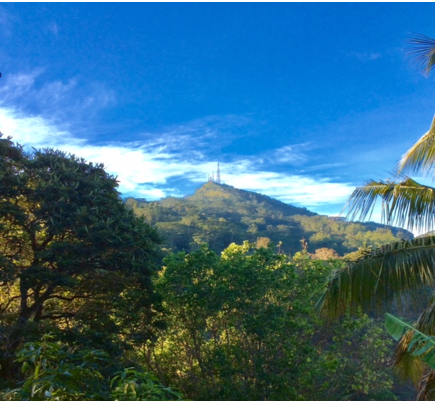
Hantana hill seen from my house
Wildlife
Once, when the children were playing cricket, they heard a dog howling frenziedly from a nearby bush, and saw that it was being swallowed by a huge python. Another time, while standing on the terrace in the evening, my son saw a leopard strolling along the road below. When told, my father was dismissive: “What leopards here?” Only a week later, they saw a photo in the newspaper, a policeman with gun in hand, standing over a large leopard he had shot at Hantana. The leopard’s crime: killing household dogs. A neighbor, who lived on the edge of the forest reserve that bordered the housing scheme, heard growling one evening. Stepping onto her balcony, she saw a female leopard walking by with two cubs. More recently, I was driving home late at night, when a family of wild boars nearly collided with the car. The mother boar was as big as a calf.
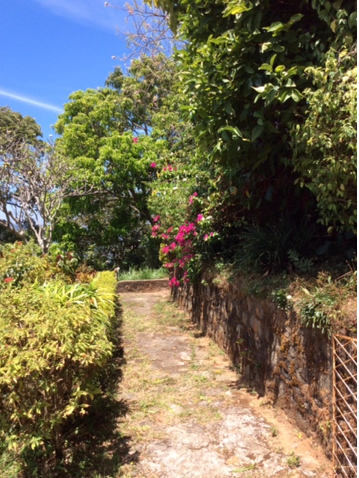
Walkway from house
The Dandumadalawa forest reserve, which began just 200 meters from my house, and extended all the way to Galaha, covering nearly 500 hectares, was home to monkeys, barking deer, wild boar, porcupines, civet cats, flying squirrels, snakes, the occasional leopard, and more than 80 species of birds. These animals sometimes wandered into the housing scheme.
During the daytime, monkeys walked along the electric wires, coming to the garden to steal mangoes and avocados. At night, wild boar and fat porcupines sneaked in, to eat up the fallen fruit. My garden was strewn with porcupine quills. I wondered if I was living in a wildlife park.
I recall an interesting story that involved my father. He had been a keen hunter in his younger days, and would go out and shoot a wild boar at Hantana once in a while. Two younger men helped him. One day, the mana grass below the house caught fire, which got out of control. The crowd that gathered saw a strange sight: my father standing on the edge of a ledge, shotgun in hand, perhaps waiting for the animals to emerge. The fire brigade, with sirens screeching, came up from Kandy, but seeing they could not do much, turned back saying it was their lunch break! Who set the fire remains a mystery to this day.
Walks
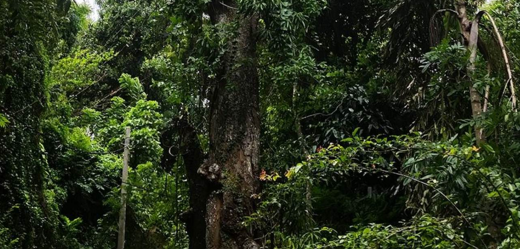
Majestic trees along the walk
The internal roads of Hantana were made for leisurely walks. From my house, I would go along the road that bordered the forest reserve, climb up to a higher elevation, and then walk downhill past the boutique hotel and the temple to my house. These were internal roads, with hardly any traffic. As I began my walk, the Dandumadalawa forest reserve, with tall, fully grown trees, was to my left, and a long row of mismatching houses to my right. These houses, abandoned by the Italians, had been completed to the whims and fancies of their individual owners. If I continued on the Forest Reserve Road, without turning right to go uphill, I would arrive at the entrance to Dandumadalawa reserve, where a resident had seen a leopardess with two cubs. Entry to the reserve was forbidden, but I would go in anyway; I meant no harm.
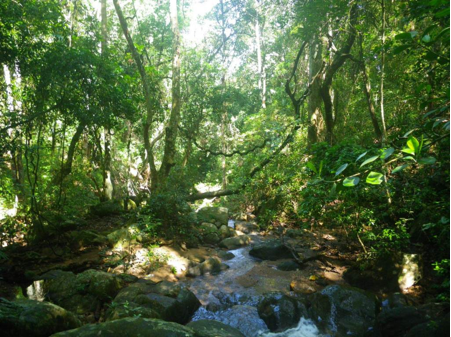
Dandumadalawa stream
I would be alone with the majestic tress, the narrow forest path, and a stream. I would sit on a boulder, the shrill cicadas would fall silent, and only the tinkling stream, and the wind in the treetops, could be heard. Beams of sunlight broke through the canopy. Such tranquility, only two miles from bustling, congested, polluted, Kandy town.
The houses along the upper road were much more attractive, and the distant hills could be seen in between. Occasionally, I would stop at the boutique hotel for a cup of tea; the manager and staff had become my friends. Then, downhill to my house, past the temple with the serene Samadhi Buddha statue. Once, while walking with my wife at dusk, we stopped to admire lights coming up around the statue, and got into a long conversation with the chief monk. We discovered that he had donated a kidney to a young mother. The woman lived not far from our ancestral home near Lunuwila, and had been a complete stranger to the monk.
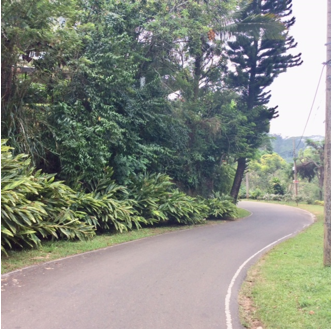
Downhill walk
After dusk, if we walked just a few yards from the house, the spectacular view of Kandy town’s glittering lights came into sight.
Neglect and Threats
My son joined us abroad in 1987, and my parents, seeing no point in living at Hantana, moved back to their ancestral home near Lunuwila. During nearly 25 years abroad, my wife and I did not give up on Hantana. We hired caretakers, a manager to rent out the house, and my sister ran a successful bed and breakfast for about a year. During visits to Sri Lanka, we would go up to Hantana for a day or two.
But all was not well at Hantana. In the early 1990s, the Housing Authority handed the scheme over to the pradeshiya sabha, and, before long, tall mana grass began to crowd the roads, and burned-out street lights were not replaced. Garbage was not cleared. Stray dogs multiplied. Older residents passed away, or moved abroad, and newcomers, who had no knowledge of the scheme’s past, moved in. The welfare society, under new management, made little attempt to improve matters. The co-op, instead of catering to the middle class clientele, became an eyesore. The sub-post office moved away. A community hall is left unfinished. Even a playground, planned for more than 20 years, is yet to be completed.
Hantana residents are mainly professionals. More doctors, lawyers, and engineers have moved in. Millions had been spent to renovate and upgrade the houses. Surprisingly, what they lack is a sense of community.
When I retired nearly ten years ago, and visits to Sri Lanka became longer and more frequent, we renovated the house at much expense, planning to reside there for half the year. Then, unexpectedly, my wife passed away. My son had settled down abroad, and I was left to manage our ancestral home, other properties, as well as Hantana.
At the ancestral home, located in a village near Lunuwila, I had domestic help, and relatives who took care of me. But, at my age and with a chronic illness, the searing heat and humidity, which seemed to worsen every year, was difficult to handle. So, I dreamt of Hantana, and traveled-up frequently, longing for the coolness, the tranquility. And Hantana did not disappoint.
But, out of the blue came a threat. A developer, working with unscrupulous officials, launched a plan to build more than one hundred houses within the existing scheme, cutting-down hundreds of trees and threatening a watercourse. The eco-system, safeguarded by the original planners, would be devastated. So, I obtained the master plan of the developer, shared it with a few other concerned residents, and we wrote to newspapers. Open meetings were held with various government authorities, and the construction plans were suspended. Mysteriously, two of my car tires were deflated, one slashed, and, one morning, I found a large rock placed on the hood. Arrogantly, the developer’s backhoe was parked near the construction site, and an ardent environmentalist had threatened to lie across its path if it began work. One day, an operator arrived and attempted to drive the backhoe. Miraculously, both front tires spontaneously deflated! Tragedy averted.
Closure
I was almost a stranger at Hantana. Most of my parents’ friends had moved or passed away. I had little in common with those who were around, except for a couple of new friends with whom I could carry on a conversation beyond mere politics. I now walked twice a day, morning and evening. Two neighborhood dogs, Socky and Goma (she was dung colored) would sometimes be my companions. Once, three stray dogs joined our group. When people stared, I would loudly deny ownership: “Not mine, not mine”.
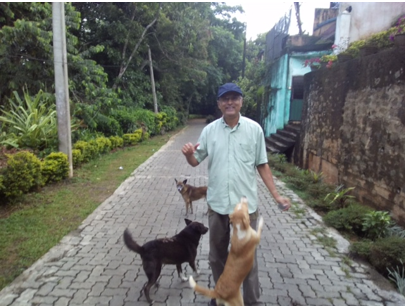
Walking with my entourage
In our cacophonous, crowded society, silence and solitude could be priceless. Hantana gave me enough and more of that. I bought loads of books in town, read voraciously, and wrote on my laptop, enjoying a direct view of the hill. But, especially at night, with no other house in sight, the “blessed, silent darkness” could also cause intense loneliness. In the autumn of my life, how long could this continue?
Then came a wake-up call. An older resident, who had been a close friend of my parents, and who had since become my friend, suddenly passed away. His children were abroad, and his wife was in hospital due to a long illness. Night after night, he had been alone at home.
I talked with my son and we decided to sell. Wanting to keep the house within the family, I offered it at a discount to two relatives. Both declined. So, I invited my son to spend a few days with me at Hantana, to say goodbye to the house. He made the long journey.
The buyer had grown up at Hantana, remembered my parents, and loved the hill. The Braines are gone, but the house is in good hands.
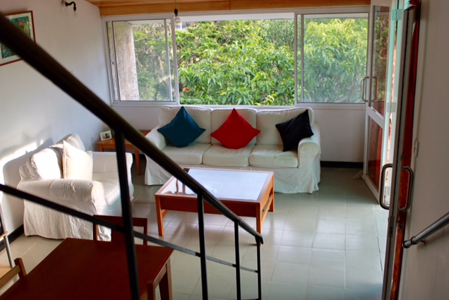
Living room seen from staircase
GEORGE BRAINE







